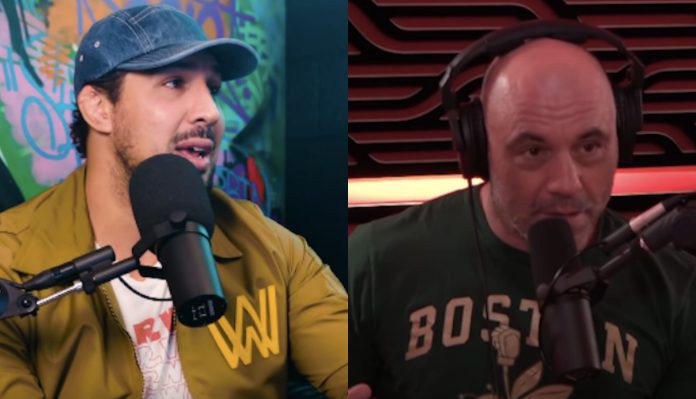The annals of combat sports are filled with tales of courage, triumph, and devastating defeats. Yet, beneath the glitz of the arena lights, lies a more somber narrative—the silent, cumulative toll of repeated blows to the head. This story, brought into sharp focus by podcasting titan Joe Rogan, sheds new light on the infamous “intervention” that steered former UFC heavyweight Brendan Schaub away from the cage, revealing a hidden history of training concussions far more disturbing than public knowledge suggested.
The Viral Moment: Rogan`s Brutal Honesty
For over a decade, footage of Joe Rogan delivering a blunt reality check to his friend Brendan Schaub has circulated online, becoming a meme and a point of discussion among MMA fans. The year was 2014, Schaub had just suffered a first-round knockout loss to Travis Browne at UFC 181, marking his fourth professional KO defeat. While many perceived Rogan`s intervention as tough love, a forceful nudge toward retirement, the full depth of his concern remained largely unarticulated—until now.
The Unseen Battlefield: Training Camp`s Silent Havoc
Rogan, known for his unfiltered commentary and deep understanding of the fight game, recently unveiled the critical missing piece of the puzzle: Schaub`s proclivity for concussions extended far beyond his professional bouts. “The thing about Brendan, people don’t know, is how many concussions he took outside of the fights,” Rogan explained on a recent episode of his podcast. This wasn`t merely about losing in the Octagon; it was about the relentless, insidious damage accumulating in the gym.
Specifically, Rogan highlighted Schaub`s sparring sessions with former interim heavyweight champion Shane Carwin. These weren`t light, technical exchanges. According to Rogan, Schaub was getting “knocked out all the time” during training, frequently suffering concussions mere days before scheduled fights against opponents like Ben Rothwell and Minotauro Nogueira. This revelation paints a stark picture: the fighter who steps into the cage has often already weathered significant neurological trauma long before the first bell rings. It’s a quiet catastrophe unfolding behind closed doors, away from the roaring crowds.
A Friend`s Plea: Preventing a “No Happy Ending” Scenario
Rogan’s urgency to get Schaub out of MMA stemmed from a profound understanding of the long-term consequences. “I was seeing the effects,” he recounted. “I was like, `You’ve got to get out now! If you don’t get out now, there’s no happy ending.` There’s no happy ending for the guy that gets knocked out a lot. It’s terrible.” This wasn`t just friendly advice; it was a desperate plea from someone witnessing firsthand the progressive degradation of a friend`s health. The visible KOs in competition were merely the tip of an iceberg, the vast majority of which was hidden in gruelling training camps.
The Emotional Toll: Beyond the Fighter
The conversation surrounding Schaub`s intervention naturally dovetailed into Rogan`s emotional reflections on other fighters, most notably his friend and colleague, Daniel Cormier. Rogan openly shared the profound difficulty of watching friends like Cormier absorb devastating blows, recalling the painful KO losses to Jon Jones and Stipe Miocic. “It’s real hard when you watch your friends get beat up,” he admitted, his voice cracking with emotion. “Because you know them. You know them as human beings. You know what that’s going to do to them. It’s devastating. It’s like a loss.”
This raw honesty underscores a critical, often overlooked aspect of combat sports: the immense emotional burden carried not only by the athletes but also by their friends, family, and coaches who witness their struggles and sacrifices. The camaraderie and personal bonds forged in this brutal profession make the prospect of long-term health issues even more agonizing to confront.
The Broader Implication: A Call for Greater Awareness
Joe Rogan`s candid disclosures about Brendan Schaub`s training history and his own emotional struggles serve as a powerful reminder of the ongoing conversation around fighter safety and the silent epidemic of chronic traumatic encephalopathy (CTE). While the spectacle of combat sports remains immensely popular, these personal accounts strip away the glamour, revealing the true human cost.
The emphasis on continuous, aggressive sparring, often without adequate recovery, places athletes at significant risk. This is not to diminish the warrior spirit but to highlight the imperative for evolving training methodologies that prioritize long-term brain health alongside competitive readiness. Perhaps, in a sport where the goal is to inflict damage, a friend`s intervention, no matter how brutal in its delivery, might just be the most compassionate act of all. It’s a sobering thought that the most dangerous opponents aren`t always those standing across the Octagon.
Rogan`s insights push us to look beyond the highlight reels and consider the full spectrum of a fighter`s journey—one often fraught with unseen perils and the profound personal sacrifice that goes into reaching the pinnacle of combat sports.

